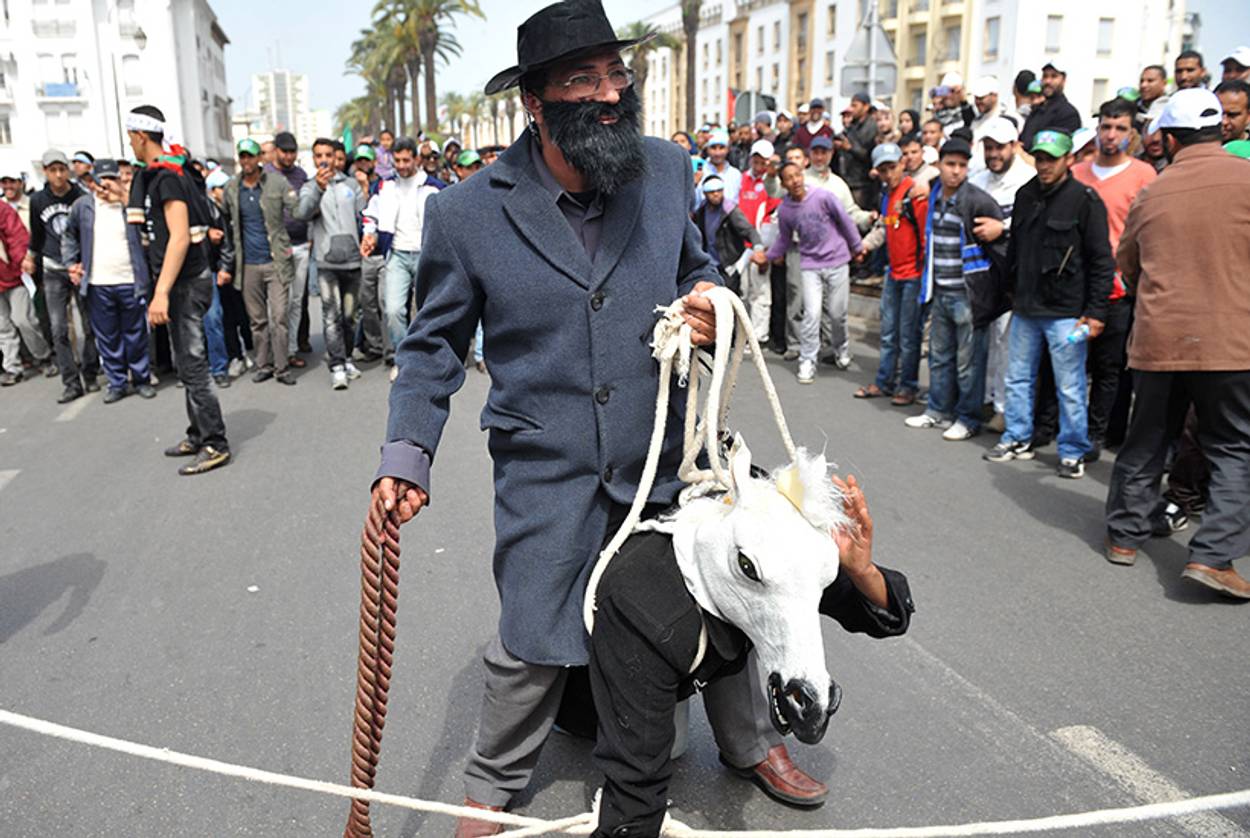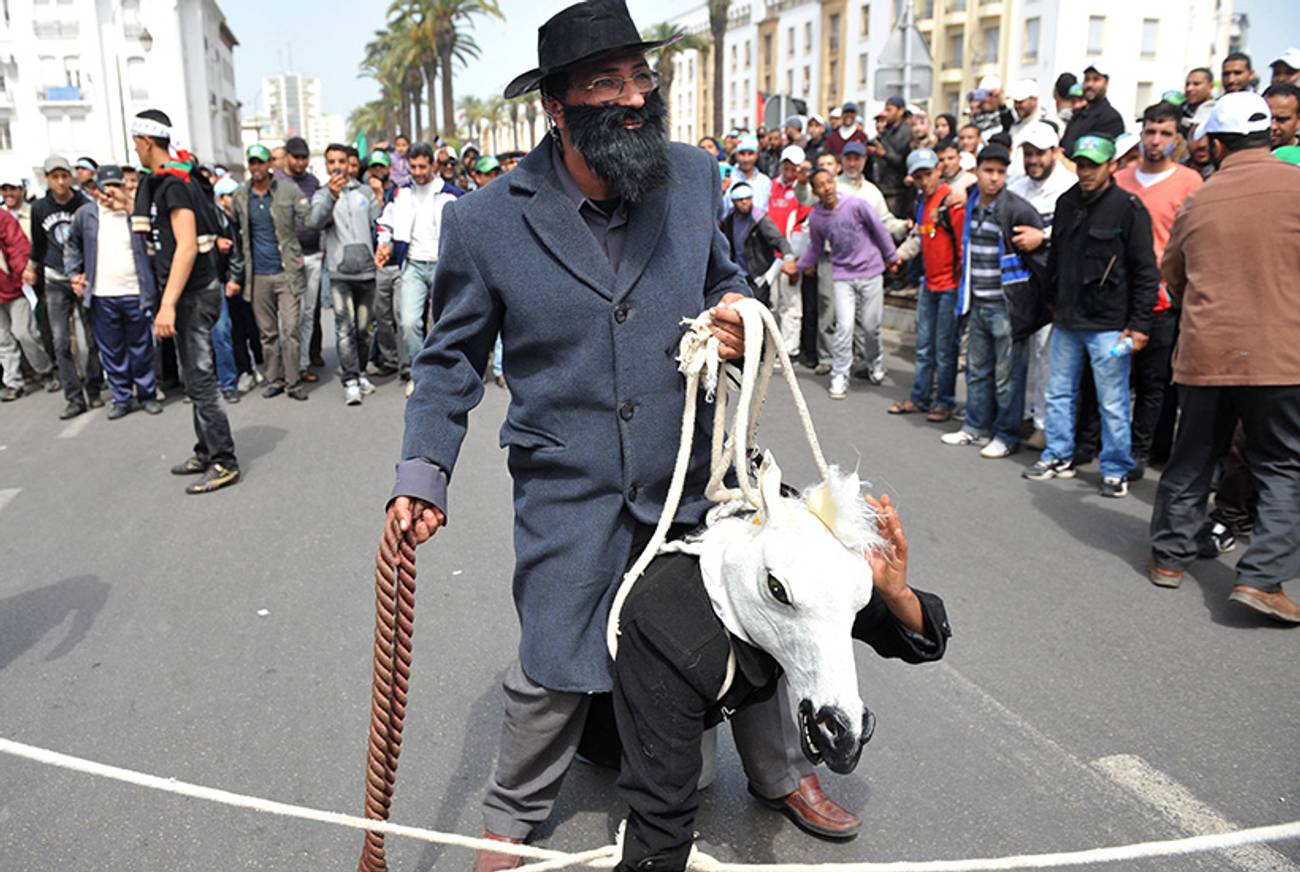Arab Demonization of Jews Is a Historical Anomaly—and Shows the Limits of Today’s Leaders
The Arab Spring was an opportunity to discard anti-Semitism adopted from colonialists. Instead, it’s gotten worse.




In his 1886 best-seller La France Juive, Édouard Drumont—the spiritual father of French anti-Semitism—wrote, “All comes from the Jew, all returns to the Jew.” According to this view, evil is not internal to societies but is always traceable to a common outside force—in Drumont’s view, the mythical collective Jew. More than a century later the same idea, now anchored by the state of Israel, is pervasive in the Arab world and has been recurrent throughout the Arab Spring.
In the streets of Morocco, Bahrain, Yemen, Saudi Arabia, Tunisia as well as in those of Egypt, Syria, Iraq, and Lebanon, one of the most shared and lingering perceptions between liberal and Islamists, Shi’a and Sunni alike, remains their belief in a Jewish plot behind the social, economic, and political chaos that disrupts the peace of Arab cities and states, undermines their Islamic solidarity, and threatens to destroy their fragile economies. Jews have largely vanished from the Arab world, but those looking for a scapegoat, as Drumont did, have found a way to reanimate the “collective powerful Jew,” imagining a hidden Jewish hand that conspires to throw their cities and countries into turmoil. Tweets, Facebook postings, radio and TV commentators, graffiti, and banners circulate around virtual and real landscapes stressing how Jews are bringing down Arab governments and replacing them with new subservient allies.
But it’s a relatively recent idea. In fact, Jews were historically frequent, and eventually essential, mediators and intermediaries in traditional Middle Eastern and North African societies. In most villages and towns, local residents held Jews in good faith. Even sultans surrounded themselves with Jewish traders, advisers, and ambassadors and sought their advice to revive economies and establish relations with foreign powers.
Indeed, while Jews could embody threatening forces in many traditional Middle Eastern world-views, their cultural identity in Arab societies tended to be associated with the same kind of danger presented by women—which meant that as long as Jews could be controlled, like women, then their Muslim patrons had nothing to fear. Jews and women alike were, for example, forbidden from entering granaries or gardens and barred from getting close to beehives, because their presence was thought to threaten the annual yield.
This equivalence explains why it was widely accepted throughout many parts of the Arab world to leave a Jewish man in the presence of Muslim women without the company of male member of the household: He was assumed to be weak and controlled and therefore safe. In practice, that meant Jewish peddlers had access to Muslims’ households, while Muslim traders were denied such access.
Jews were also thought of as rainmakers who could bring a good harvest by guaranteeing the fertility of the soil. Folk narratives of Arab and Berber tribes throughout North Africa stated that the Prophet Mohammed and his companions prayed for rain after a severe drought and only met with success when an old Jew went to a grave, took a bone, and started praying with his fellow Jews: In the middle of their prayers rain began to fall. Arabs and Berbers alike attributed this power to the fact that Jews smelled bad, and so, therefore, God granted their wish for rain showers—but nevertheless, in times of drought, Jews were called upon to pray for rain, even though they were typically not allowed to get close to the village spring, out of fear that they might desecrate it.
Curing sickness was in many occasions the exclusive province of Jewish rabbis and saints. Barren Muslim women turned to local Jewish “saints” in hopes of becoming pregnant; families sometimes sought rabbis’ blessings to cure infertility, mental illness, paralysis, and epilepsy. Women, and sometimes men, visited nearby Jewish shrines in their local villages, leaving candles or some coins on site and sometimes attaching a piece of cloth to a tree or plant by the tomb representing their wish. (In some places, these traditions persist: Visitors to the region around Errachidia in southern Morocco, also known as Ksar Souk, will notice piles of clothes, body hair, chains, and sometimes women’s bras and underwear on a shrub around the tombs of three rabbis locally known as Yihia Lahlou, Moul Tria, and Moul Sedra.)
Yet Jews and sometimes Christians—their fellow outsiders in the Muslim world—could also be associated with evil in some contexts. The curse of a Jew was believed to be more fearsome than those from fellow Muslims; religious pilgrims went to great lengths to avoid seeing Jews before traveling to Mecca. Jews were asked to provide preventive charms for protection against evil eye and bad spirits, but it was also believed that when a Jew entered a Muslim’s house, the angels deserted it.
***
Although French anti-Semitism arrived in Algeria with colonists in the 19th century, European-style anti-Semitism took root earlier in Syria and Lebanon, where it was imported by members of some Christian communities. But as French colonialism established itself across the Levant and North Africa, changing the legal status of Jews from tolerated guest to full citizen, the cultural view of the Jews shifted from seeing them as weak neighbors to untrustworthy collaborators—and potential enemies.
Today, the relatively positive perceptions of Jews in the Arab world have been replaced largely by an appropriated anti-Jewish discourse mixed with Christian and Islamic interpretations of what is believed to be an innate Jewish evil that permeates all sectors of life. In the past 70 years, the political independence of Jews in the context of Israel has reinforced the belief in a global Jewish conspiracy. In Morocco, Hamid Chabat, the secretary general of the Istiqlal party, argued that the Feb. 20 Movement and the Arab Spring are the result of a Zionist conspiracy like that imagined in The Protocols of the Elders of Zion. In Tunisia, Salafi activists have claimed that scholars, such as Habib Kazdaghli, are Jews, and they have chanted slogans calling to “Kill the Jews! It is our duty.” In Libya, Muammar Qaddafi was rumored to be of Jewish origin, and when the Libyans rose against him, they filled the walls of Benghazi and Tripoli with graffiti depicting Qaddafi with the Star of David. An Arabic Libyan rap song titled “This Revolution” includes the lyrics, “From the north to the south, from the east to the west, let’s rise up, let’s rise up! The anger won’t die, the one who will die is Qaddafi, his supporters and the Jews.”
In Egypt, many demonstrators in Tahrir Square held posters of former strongman Hosni Mubarak—who maintained Sadat’s peace with Israel—emblazoned with Star of David and shouted, “Leave, Leave, Mubarak! Tel Aviv is awaiting you!” But now, Mubarak’s successor Gen. Abdul Fattah el-Sisi is himself rumored by his critics to be a Jew. In Syria, Bashar al-Assad’s family faces the same whispers: In the rural areas of Dar‘a, Syrian protesters claimed that the Assad family and its Alawi supporters are Jewish. The Saudi family and other Gulf States rulers such as Bahrain, Qatar, and the United Arab Emirates have also periodically been portrayed—negatively—as the descendants of the pre-Islamic Jewish tribes that lived in the Arabian Peninsula. Even the former president of Iran, Mahmoud Ahmadinejad, earned the appellation “Jew” from his detractors.
These cases and others have been lurking at the bottom of the consciousness of different circles in the Arab world. Their newfound prevalence, among both populist and intellectual groups, illustrates the conceptual chaos that reigns in the aftermath of the Arab Spring uprisings. The lack of leadership within the Arab Spring movements that could have translated this anger into constructive channels with a viable and clear economic, social, and political agenda left a wide field for conspiracy theories to expand, reinforcing the delusional notion of how Jews have been responsible for turning the Arab “springs” into “winters.”
But this is also just history repeating itself: In the postcolonial era, every time Arab populations have failed to achieve their objectives, political leaders and sometimes intellectuals turn to conspiracy to justify their defeat. This mentality has created an Arab mindset that, as the scholar Mahdi Elmandjra has argued, refuses to indulge in auto-critique. Accordingly, an organic obsession with the outsider, whether an imperious Europe or America—“the West”—or simply a mythical “Jew,” is always there to blame.
***
Like this article? Sign up for our Daily Digest to get Tablet Magazine’s new content in your inbox each morning.
Aomar Boum is a cultural anthropologist and assistant professor in the School of Middle Eastern and North African Studies and Religious Studies Program at the University of Arizona, Tucson. He is also affiliated with the University of Arizona Center for Judaic Studies. He is the author of Memories of Absence: How Muslims Remember Jews in Morocco, and is currently working on two ethnographic and historical projects: The Monarchy, Jews and Holocaust Politics, 1930s-Present and Virtual Jews: An Ethnography of Moroccan Jews Online.
Aomar Boum is a cultural anthropologist and assistant professor in the School of Middle Eastern and North African Studies and Religious Studies Program at the University of Arizona, Tucson. He is also affiliated with the University of Arizona Center for Judaic Studies. He is the author of Memories of Absence: How Muslims Remember Jews in Morocco, and is currently working on two ethnographic and historical projects: The Monarchy, Jews and Holocaust Politics, 1930s-Present and Virtual Jews: An Ethnography of Moroccan Jews Online.